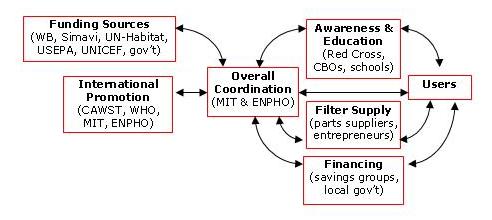Summary |
Objective:
To promote the KanchanTM Arsenic Filter (KAF) in rural Nepal through an innovative and self-reliant implementation model, with emphasis on sustainability.
|
Lead Agencies:
Massachusetts Institute of Technology (MIT), USA
Environment and Public Health Organization (ENPHO), Nepal
|
Funding Source:
World Bank Development Marketplace 2003, US$115,000 grant
World Bank Development Marketplace 2005, US$20,000 grant
Simavi Foundation 2005, US$70,000 grant
US Environment Protection Agency P3 Competition 2005, US$10,000 award
UN-Habitat, Water for Asian Cities Programme 2006, US$6,000 grant
St. Andrews Prize for the Environment 2006, US$10,000 award
|
Project Duration:
January 2004 to December 2007
|
Project Background:
Since 1999, MIT and ENPHO have conducted field research in Nepal on drinking water contamination. In 2002, the MIT-ENPHO team developed the KanchanTM Arsenic Filter (formerly called the Arsenic Biosand Filter). This household-level water treatment technology is designed to remove arsenic and microbial contamination in tube well water commonly found in rural Terai region of Nepal. The KAF can be constructed by trained local technicians using locally available materials such as iron nails, sand, gravel, plastic buckets, and PVC pipes. A one-year pilot study from 2002-2003 showed high user acceptance and excellent technical performance.
|
Key Project Activities:
The KAF project is implemented in an innovative, demand-driven approach, based on a social entrepreneur business model and on partnership among stakeholders. The project facilitates a variety of capacity building and support programs to equip the locals with knowledge and skills to build and maintain KAFs by themselves, promoting long-term sustainability.
Key activities conducted so far include:
- Established a KAF reference centre at ENPHO in Kathmandu to provide the general public information related to the KAF technology and implementation activities, and well as to offer training and consulting services.
- Coordinated with key stakeholders including government departments, NGOs, CBOs, donors, and local universities to effectively plan and implement KAF activities in various regions of the country.
- Trained 20 local partner organizations from across the country as KAF “entrepreneurs” to construct, promote, sell, and distribute filters to customers.
- Collaborated with Nepal Red Cross Society to conduct health education campaign, filter demo workshops, household visits, street dramas, school programs, and radio broadcasts, to raise the awareness on water contamination and health among the affected rural population.
- Developed a pro-poor micro-financing scheme involving women savings groups to provide filter loan for potential customers.
- Optimized filter supply chain and negotiated better pricing to improve filter accessibility.
- Disseminated project information through conferences, website, workshops, and seminar.
|
Implementation Model

|
Current Status
This project has raised awareness among rural villagers about water quality and health such that they can make informed decisions to protect their health. The KAF technology is currently available to the grassroots level in a sustainable manner. As of September 2006, over 3500 filters are in operation throughout the country, serving in excess of 25,000 rural population.
|
Future Plans
In collaboration with the Centre for Affordable Water and Sanitation Technology (CAWST), we are promoting the KAF technology in Cambodia and Bangladesh. Courses on how to build and promote the KAF is also offered by CAWST in their Calgary, Canada office.
|
For more information, please contact:
Susan Murcott (murcott@mit.edu)
Senior Lecturer
Massachusetts Institute of Technology
Civil and Environmental Engineering
August 21, 2006 |
|